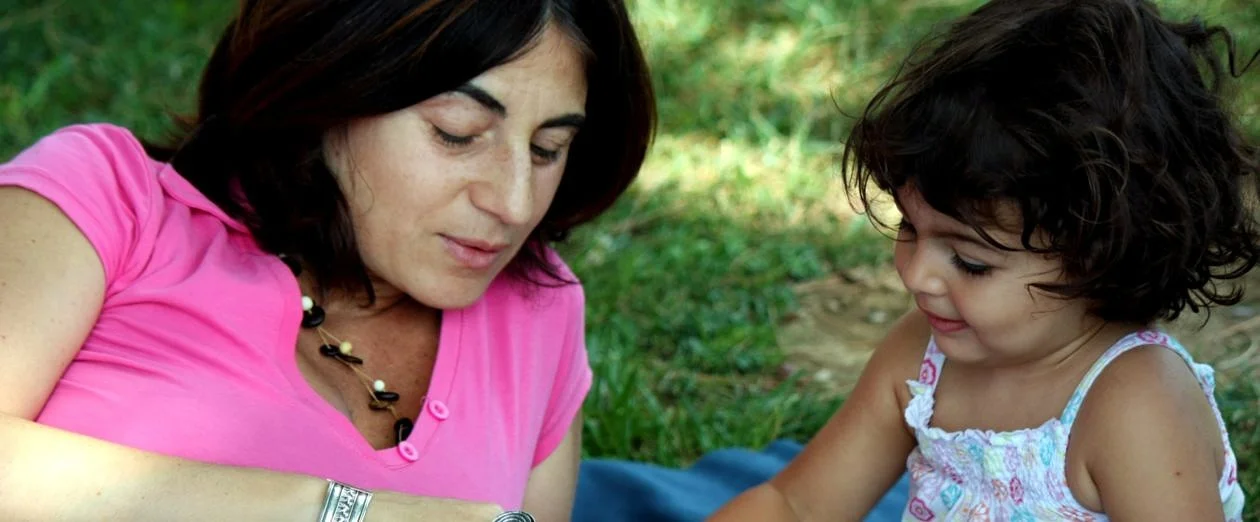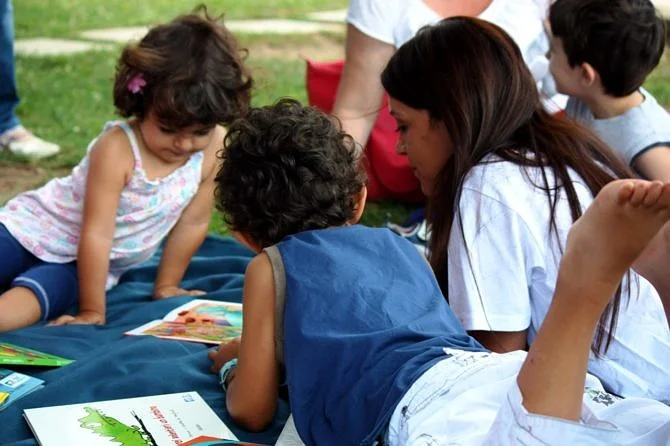Nati per Leggere (NpL)
Nati per Leggere (Born to Read) is one of the largest early childhood development programmes in the world, covering as many as one in four infants born in Italy.

Zoom in Details
Nati per Leggere (NpL, Born to Read) started in 1999 to promote shared reading from the first months of life.
Engaging in early reading supports child development and responsive parenting and helps to protect against socio-cultural disadvantage and educational poverty.
- Government Agencies Engaged:
- Education, Health, Culture, Welfare
- Implementing Agency:
- NpL is led by the Centro per la Salute del Bambino (CSB, Centre for Child Health). Programme implementation is supported by the Cultural Association of Paediatricians (ACP), the Italian Library Association (AIB) and the CSB. In addition, programme implementation has some support from the government, based on specific grants and funding calls.
- Funding Source:
- NpL is funded by a range of sources, including public administrations, foundations, for-profit (through corporate social responsibility initiatives) and non-profit entities, at different levels. Specifically, 40% of funding comes from public entities at the national and regional levels, 30% from income generation activities, such as training courses and the sale of materials, and 30% from private donations. Overall, government support is less than 20% of the overall budget.
- Scale:
- NpL is a nationwide programme which is active throughout Italy with around 800 local projects involving more than 2000 municipalities. Local networks and branches are run by multi-sector networks, coordinated by librarians (2243 public libraries are actively involved), paediatricians (1673) and educators (1220 childcare services). Over 80 punti lettura (reading points) have been established in disadvantaged areas where libraries and childcare services are lacking.
- Area:
- Parents+
- Implementation action in focus:
- Build your team
- Location:
- 20 regions, Italy (national)
- Reach:
- — Families: 250,000 per year
— Children up to age 5: almost 300,000
— Newborns: almost 85,000
— Number of paediatricians who promoted NpL in 2018: almost 2000
— Number of libraries that promoted NpL in 2018: almost 2500
— Number of preschool programmes (age 3–6) that promoted NpL in 2018: more than 3000
— Number of childcare centres (birth to age 3) that promoted NpL in 2018: almost 2000
— Number of volunteers who promoted NpL in 2018: almost 6500
— Regions: 20 (out of 20)
— Municipalities: more than 2000 (out of 7954) - Share:
- Print:
Summary of Intervention/Programme
Since 1999, NpL has encouraged families to read with their children from birth. The main objective is to improve literacy skills and to foster the parent–child relationship. NpL achieves this by providing parents with the tools to consolidate an unbreakable bond with their child. The programme builds on robust scientific evidence which highlights the positive influence that sustained and regular reading activities have on children’s cognitive, linguistic and socio-emotional development. These early influences also have significant long-term effects throughout adulthood.
“The idea is simple, feasible, meaningful and so people get quite quickly involved in implementing the programme or supporting the programme.” — Georgio Tamburlini, President of the Centro per la Salute del Bambino
The programme involves health professionals, librarians, educators, civil society associations, municipalities, regional governments and volunteer readers. Through them, NpL offers families a variety of activities that include: reading activities, advice from paediatricians and other health professionals; books for free or at a low price; public reading events; book fairs; and annual events such as the National Nati per Leggere Week.
Currently, the programme is starting to include elements such as play and music, which are also key interactive moments that strengthen responsive parenting.

What worked well
Although NpL is similar to other programmes which promote shared reading, it is informed by a number of operational principles that make it an interesting model of a scaled-up early childhood development programme.
Multi-sector involvement
Since the beginning, NpL has promoted cross-sectoral collaboration at national (Ministries of Health, Education and Culture) and regional (Departments of Health, Education, Welfare, Culture) levels across Italy’s 20 regions. In addition, this strong involvement of diverse stakeholders has established a whole-society approach. Beyond public administrations, the programme is actively supported by professional societies (through the involvement of professional people, development of guidelines, and in-service training), academic centres (with pre-service training and postgraduate courses), NGOs and parents’ associations.
Multi-professional training
Every year about a hundred courses are run all over the country to train approximately 2500 new professionals, in the health, education, social and cultural sectors. These training courses build new local networks and branches which support the implementation and scaling of the programme. Most of the training brings together different professional groups to build intersectoral local networks and ensure that language and conceptual understanding are shared. As a result, coherent and consistent messages are conveyed to parents, by multiple professionals and services.
Engagement of volunteers
Volunteers are essential to the programme: almost 7000 volunteers are active in hospitals, clinics, public libraries and childcare centres. The duration of volunteer work with the programme can vary, from a few months to several years. Usually, volunteers participate in NpL activities and services two to four times per month.
An entry point to a broader ECD approach: Nutrire la Mente (Nurturing the Mind)
Over time, NpL has progressively encompassed other development-focused parenting practices such as music and play, and promotes multi-professional training in early childhood development, embracing the philosophy and perspective of nurturing care, particularly the responsive parenting component. In 2018, a major programme addressing families in disadvantaged neighbourhoods was launched, based on the NpL network. The programme Un Villaggio per Crescere (A Village to Grow Together) establishes centres where participating parents get actively involved in shared reading, music, motor activities, play and gardening with the children.
Monitoring positive effects for children and their families
Monitoring and evaluation exercises are carried out at national and regional levels. A major effort to assess the impact of the programme on parents’ knowledge, attitudes and practices has been undertaken, both at national level and in two regions (Piemonte and Friuli Venezia Giulia). Reading practice at family level (at least four times a week when the child is 3 years old) has increased from 16% in 2001 to 39% in 2019 among Italian families and the proportion of families who never read has decreased from 40% in 2001 to 10.9% in 2019. Differences in reading practice between parents with a university degree and parents with a low education level also decreased, with parents with little formal education now routinely reading with their children almost as often as parents with a university degree..
In addition, according to Georgio Tamburlini, President of the Centro per la Salute del Bambino, the programme has supported a significant increase in the production and sale of books for young children (up to age 6).
What didn't work well
Although NpL is very well received, programme implementation still faces a number of challenges.
Funding
Currently NpL does not have sufficient public and private financial support to continue to scale the programme to reach out to more municipalities and professionals.
Reliance on volunteers
Considerable resources are needed to bring in volunteers from professional sectors and maintain their commitment. For example, currently, out of the 10,000 paediatricians in the country, only one in five is active in the programme, as it is not mandatory for them to promote reading and books. NpL is constantly searching for ways to reach new paediatricians, and to train and support them with materials. To do this, NpL reaches out to universities and other educational institutions, to achieve awareness among trainee doctors before they enter their professional field.
Support from civil society
Getting communities, municipalities and regional governments on board can also be challenging. Their buy-in helps considerably to get more professionals engaged in the programme. For example, in a third of regions, agreements exist with the union of paediatricians that outline the financial and non-financial incentives available to motivate paediatricians to participate in and promote the programme. This has led to increased professional participation.
Accessing families in need
Finally, some local projects have been unable to reach the families most in need, although efforts have been made to overcome language and other social barriers by providing multilingual materials and encouraging the local branches to pay specific attention to families that are less likely to read due to their economic, social or cultural circumstances.